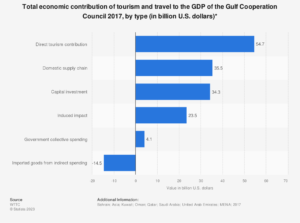Gulf Cooperation Council has been accepted a single tourist visa for nations in the Gulf and may be implemented as early as next year.
According to a report by state news agency Wam, which quoted Minister of Economy Abdullah bin Touq Al Marri, the procedure to implement the visa will be considered the next month. The revolutionary Schengen-style visa was authorized at a GCC ministerial conference in Muscat, as the Khaleej Times reported.
Tourists can experience the six countries that make up the Gulf bloc – the United Arab Emirates, Saudi Arabia, Bahrain, Qatar, Oman, and Kuwait, with just one visa. According to Al Marri, Wam should anticipate to see the implementation of the visa around 2024 or 2025, conditional upon the finalization of implementing laws.
GCC Secretary General Jassim Al Budaiwi announced, “The project of unifying the Gulf tourist visa is expected to facilitate and streamline the movement of tourists and residents among the six GCC countries, thereby positively impacting the tourism and economic sectors,” stated Budaiwi.
He went on to say that the council is creating a thorough anti-drug plan to address drug-related concerns and has approved the electronic linking of traffic violations among GCC states.
The 40th meeting of the ministers was held in Muscat, the capital of Oman, where they approved the introduction of an electronic system that links violations of traffic laws.

Sheikh Rashid bin Abdullah Al Khalifa, the interior minister of Bahrain, Sheikh Saif Saeed Al Nahyan, the interior minister of the United Arab Emirates, Abdul Aziz Saud Al Saud, the interior minister of Saudi Arabia, Sheikh Khalifa bin Hamad Al Thani, the interior minister of Qatar, and Sheikh Talal Khalid Al Ahmed Assabah, the first deputy prime minister of Kuwait also took part in the meeting.
A Single Route to Gulf Economy
The Gulf Cooperation Council’s 2030 plan includes the single GCC tourist visa as a means of boosting the tourism industry’s GDP contribution by increasing the number of travelers staying in GCC hotels and intercity flights.
The UAE boasts the most number of tourism attractions (399), out of all the Gulf countries, as part of the Gulf Cooperation Council’s 2030 agenda. The UAE is also the host of the greatest number of these events with 73 of the 224 tourism related events and activities held throughout the Gulf area.
Al Marri revealed that the GCC governments would look into a single tourism route that links the six nations in the upcoming phase. He stated that foreign visitors who plan to stay for more than 30 days will choose this option. The development of the Emirati tourism route, which unites all seven emirates, was another topic of discussion held by the UAE’s Emirates Tourism Council.
At 14% of the country’s GDP, tourism is one of the primary generators of the UAE’s economy. The UAE minister stated, “Our goal is to raise this sector’s contribution to 18%.”

The economies of the Gulf have established powerful infrastructure, enabling the travel and tourism industry to draw in foreign visitors. The tourism hub of the region, Dubai, is among the world’s most visited places; in the first half of 2023, it saw 8.55 million overnight foreign guests, an increase over pre-pandemic levels.
Management in the hotel and travel industries think that this Schengen-style tourist visa will revolutionize not only the industry but also the region’s economy as a whole, generating tons of new job opportunities for residents and citizens.
Growing Tourist Targets in Gulf
As part of the 2023–2030 strategy, the GCC countries are targeting increasing foreign tourism by almost 220 percent, to 128.7 million by 2030. This unified single visa will be crucial to reaching that goal.
As global travel and tourism recovered quickly following the pandemic, the number of tourists to the Gulf countries reached 39.8 million last year, a growth rate of 136.6 percent compared to 2021.
The Gulf countries, according to Al Marri, aim to see a 7% annual growth rate in the travel and tourist industry. According to estimates, the sector’s overall value will increase by 8.5% to $185.9 billion in 2023 from $171.4 billion in the previous year.

By the end of 2023, GCC tourist expenditure is predicted to increase 12.8% to $96.9 billion (Dh355.6 billion), according to the UAE ministry. Incoming visitor spending in the area is expected to rise by 8% annually by 2030, reaching $188 billion (Dh690 billion).
By the end of 2022, tourists visiting Dubai would have a choice of 810 accommodations with 148,689 rooms, while the GCC would have 10,649 hotel establishments overall.
With 1,114 hotel properties, the UAE is the second-largest Gulf nation behind Saudi Arabia. There are 674,832 hotel rooms in the Gulf overall.












Comments 2